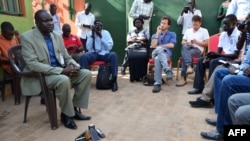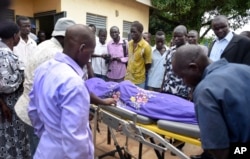South Sudanese journalists said Tuesday that their work is not only challenging, but that their lives can be put in danger when they seek out the truth.
Reporters have little to no access to information from government departments, they said, and scores of journalists have been harassed and even detained for weeks by people believed to be government security operatives.
The reporters spoke at an event in Juba marking World Press Freedom Day — in a country that ranked 140th out of 180 countries on the 2016 World Press Freedom Index, as compiled Reporters Without Borders.
At the event, journalists and citizens gathered to recognize the critical role reporters play in South Sudan, and to shine a spotlight on the mistreatment of journalists.
Silent treatment
Philip Wani, a reporter with the United Nations’ Radio Miraya in South Sudan, said he'd often gone into the field to gather or verify information and found that officials would refuse to talk to him.
“An official will not be transparent to you," Wani said. "He will require you to come with a written letter you have to take to his boss — you know, a lot of bureaucratic procedures.”
Wani said that just last week, when First Vice President Riek Machar arrived in Juba to take his role in the national unity government, security operatives blocked some journalists from getting to the airport and the presidential palace, making it difficult to cover the story of Machar’s long-awaited arrival and subsequent swearing-in.
Josephine Achiro, director of the Catholic Church-owned Radio Bhakita, said that kind of behavior is not unusual in South Sudan.
“We face a lot of insecurity," she said. "The issue of mobility is also one of the things. In most cases, this is one of the major problems we have. We cannot access going outside Juba because of mobility, transportation and insecurity.”
Achiro said some South Sudanese journalists have been physically attacked, while others have received threatening messages on their phones.
7 journalists killed
The Union of Journalists of South Sudan and the Association for Media Development in South Sudan are among the groups that organized Tuesday’s event under the theme “Access to Information and Fundamental Freedoms: This is Your Right.”
Union of Journalists Chairman Oliver Modi said government security agents continue to harass, detain and arrest journalists. In the past year, seven journalists were killed in South Sudan, and not one suspect has been questioned in connection with any of the killings, he said.
“The challenges that are facing the media industry in South Sudan, and particularly the journalists, is the recognition of the rights of journalists to work in a free and fair environment," he said. "In the last two years, journalists have been harassed and arrested, and the arrests are not being carried out in a legal procedure. There has been some sort of intimidation.”
Modi said government officials must abide by South Sudan’s media laws when interacting with journalists.
Prodding from U.N.
Eugene Owusu, deputy representative of the U.N. secretary-general in South Sudan, called on the government to improve its relationship with the media.
“As this country moves forward to bury its past and chart a new future, press freedom and access to information will be central to the quality of transitional justice, reconciliation and the wider democratic reform agenda that we seek to achieve,” he said.
Owusu called on the government to use the recently enacted media laws to improve the working environment for journalists across the country, and demonstrate its willingness to support the media. He also reminded journalists about the importance of reporting accurately on the news.






